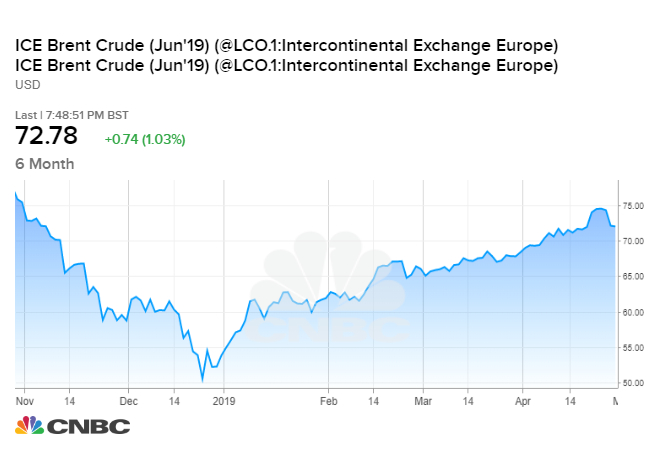President Donald Trump is about to launch the latest phase of his "maximum pressure" campaign against Iran, and BP CEO Bob Dudley says the commander-in-chief to deal the oil market a major wildcard.
When the clock strikes midnight on Thursday, the United States will officially end sanctions waivers that allow eight countries to import Iranian oil. Dudley says the move, which is meant to drive Iran's oil exports to zero, is responsible for sending oil prices to nearly six-month highs last week.
"Now the U.S. is saying they're going to ... take away those waivers again, and the oil price is clearly drifting up because of that," he told CNBC's Brian Sullivan during an interview at the Milken Institute Global Conference in Beverly Hills, California on Tuesday.
"I think the key — the wildcard key — is will the U.S. at the last minute give some more waivers or not?" Dudley said.

The answer to that question will influence whether oil prices rise or fall, says Dudley.
While the Trump administration insists there will be no grace period for Iranian oil buyers, it has surprised the market on more than one occasion.
Trump's threat to impose tough sanctions on Iran drove Brent crude oil to nearly four-year highs at $86 a barrel last October, according to Dudley. The president's decision to allow several of Iran's biggest customers to continue importing Iranian barrels in November contributed to Brent's collapse to $50 a barrel, he says.
Last week, the Trump administration said it will stop issuing the exemptions on May 2. The market widely expected Trump to extend them for another six months, tightening the waivers but not ending them outright.
Analysts are still trying to determine how many Iranian barrels will come off the market. China and Turkey, two countries that received waivers, have condemned the U.S. sanctions and are widely expected to seek ways to continue importing Iranian oil.
Oil prices plunged on Friday after Trump said he had "called up" OPEC and told the producer group to take measures to tame gasoline prices. U.S. officials say they have secured pledges from Saudi Arabia and the United Arab Emirates to fill the gap left by Iranian supplies, but the OPEC members have not explicitly committed to pumping more oil.
Crude futures have clawed back some gains this week after Saudi and OPEC sources denied that Trump spoke to top officials about cutting fuel costs. Prices also got a boost after Saudi Energy Minister Khalid al-Falih suggested on Tuesday that OPEC could extend a deal to cap output through the end of 2019.
The plunge in oil production in Venezuela, which is also under U.S. sanctions, has also contributed to the run-up in oil prices, Dudley said.
via IFTTT
No comments:
Post a Comment